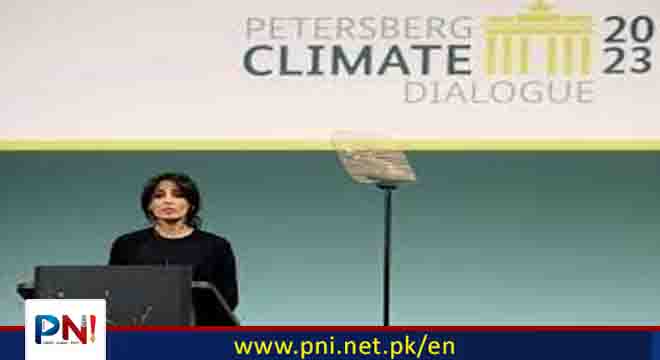ISLAMABAD, September 20, 2023 (Online): The upcoming COP-28 is a crucial moment in the global fight against climate change and we must use this opportunity to create an enabling environment to achieve the goals set in the Paris Agreement in 2015.
This was stated by H.E. Hamad Obaid Ibrahim Salem Al-Zaabi, the Ambassador of United Arab Emirates, while speaking at a High-Level Policy Dialogue on “COP-28 and Beyond: Strengthening Climate Action through Public-Private Partnerships”. The dialogue was jointly organized by Sustainable Development Policy Institute (SDPI), Pakistan Renewable Energy Coalition, and the Embassy of United Arab Emirates in Islamabad, here.
The UAE ambassador said that the upcoming COP-28 is an excellent opportunity to reset our course, accelerate global commitment and efforts to refocus global stock take for finding solutions to the common climate challenges. “We firmly believe that this global challenge requires collaborative efforts of the governments and private sector at global level.
Jacob Linulf, the ambassador of Denmark, while reiterating his country’s support for loss and damage fund for Pakistan, said that Pakistan needs to develop a conducive ecosystem for attracting international climate finance.
Dr Abid Qaiyum Suleri, SDPI Executive Director, said that climate change is a multi-pronged issue, which is manifesting in different forms and affecting countries without any discrimination. “We need a multipronged strategy to address the complex challenges by joining our heads and hearts to find viable solutions making private sector as part of the solutions for a meaningful climate action. He elaborated that this dialogue has been convened to learn how renewable energy transformation and technology can be adopted to replace carbon-intensive solutions with renewables. Highlighting the role of public-private partnerships in developing net-zero cities, he recalled that the City of Masdar is the only zero carbon city in the world, which was built in the aftermath of collaboration among public and private sectors, academia, civil society organizations, etc.
Earlier, in his opening remarks, Ambassador Shafqat Kakakhel, the Chairperson of SDPI Board of Governors, said that UAE has been organizing remarkable climate-friendly industrial exhibitions since long to promote sustainable energy and green technologies. The most significant development in COP-27 was the loss and damage fund and technology transfers among states. However, he said, the question of early warning systems and technologies transfer to developing countries is still there. He stressed that the commitment of US$ 100 billion annually can be met and scaled up in COP 28 with particular focus on green and sustainable technologies. He said public-private partnerships must be strengthened in letter and spirit to increase financing in clean energy sources for a sustainable future of the world.
Later, Syed Mujtaba Hussain, Senior Additional Secretary, Ministry of Climate Change, said climate agenda has to be an all-nation effort, encompassing collaboration between all stakeholders from public, private sector and civil society organizations through comprehensive cross-sectoral interventions. “We must translate the plan of action into actionable projects to tap into the real potential of international climate finance. This objective is not achievable without meaningful involvement of the private sector as well as the civil society, he added.
Zafar Masood, President of Bank of Punjab, said that the climate agenda is so enormous that it requires inclusivity and collaboration, the buy-in must come through collaboration among civil society, government and public sector to meet the ambitious climate action agenda. He further said that the Gulf Cooperation Council is the most relevant region for climate finance as they have evinced keen interest in financing bankable projects in Pakistan.
He added that the role of private sector is crucial but public sector must take up projects and financing in novel and unchartered areas to attract international climate financing.
Zeeshan Sheikh, the Country Manager of IFCC, emphasized that the Green Climate Fund funding mobilized by public and private sector in Pakistan is less than rest of the world. He stressed that climate action projects must be elevated with actionable commitments and bankable outcomes. He further stressed the need for blended funding options in different sectors like water, energy, and waste.
Bilal Anwar, the Chief Executive Officer (CEO) highlighted the need to mobilize climate finance to support Nationally Determined Contributions (NDCs) of Pakistan. Along with public sources, he said, a substantial potential exists in the private sector, which Pakistan needs to tap. He suggested that private sector must be provided with an enabling environment that mobilizes them to shift their investments towards climate adaptation and mitigation projects.
Aisha Khan, the Executive Director of Civil Society Coalition for Climate Change, remarked that the financial commitment made by the global north in Paris Agreement has to be met and the upcoming COP 28 should focus on increasing investments in global climate finance architecture, resilient infrastructure and loss and damage. She added that public finance is insufficient, public private partnerships and blended finance must play a key role in climate action.
Muhammad Mustafa, Program Officer, Renewables First and Co-Chair of Pakistan Renewable Energy Coalition, highlighted that the world is off-track on the emissions reduction target to keep and requires an investment of US$ 4 trillion by 2030 while the current investments are half of what is needed to keep on-track. He stressed that there is a huge gap in climate finance from the private sector as well especially towards developing countries, leaving much to be desired in terms of climate action.







